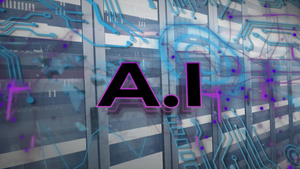Many IT Leaders Feel Infrastructure, IT Teams Aren't AI-Ready: ReportMany IT Leaders Feel Infrastructure, IT Teams Aren't AI-Ready: Report
The Equinix 2023 Global Tech Trends Survey finds enterprises plan to increase IT hiring and adopt digital twin technology, but most say fulfilling environmental regulation requirements is a challenge.

Many enterprises are adopting artificial intelligence to improve their IT and business operations, but a new study by Equinix shows that a significant percentage of organizations don't have the right IT infrastructure or in-house expertise to take full advantage of the technology.
Today, 85% of global IT leaders are already using or planning to take advantage of AI. However, 42% doubt that their existing IT infrastructure can handle AI demands, and 41% are not comfortable with their IT team's ability to accommodate the growing use of AI, according to the Equinix 2023 Global Tech Trends Survey.
The annual report, released today, surveyed 2,900 global IT decision-makers this spring on technology trends, sustainability, their IT hiring plans, and the top threats to their business success.
IT leaders in Europe, the Middle East, and Africa (EMEA) were most uncertain about their infrastructure's AI readiness, with 49% questioning whether their infrastructure could handle AI workloads. That was followed by IT leaders in Asia-Pacific (44%) and those in the Americas (32%) who felt the same way. In the U.S. alone, 36% of 100 U.S. IT leaders surveyed by Equinix felt their existing infrastructure and IT teams were not ready for AI.
How to Prepare Your Infrastructure for AI
The survey results on AI readiness speak to a need for enterprises to upgrade or modernize their IT infrastructure, either in their on-premises data centers or through colocation facilities or cloud services. That includes not just data center infrastructure, but also making sure networking infrastructure can handle AI workloads, said Equinix Senior Technologist Kaladhar Voruganti.
"A lot of times when you are doing AI, all the data is not within your four walls," Voruganti told Data Center Knowledge in an interview. "They have to go to the cloud or to data brokers. They have to go to external data sources, and safely at high speed, they have to bring that data to where their AI computation is happening. So from a networking standpoint, they have to rethink how they're going to create their AI infrastructure."
The survey on AI readiness also highlights the need for enterprise IT organizations to hire outside expertise or train current employees, so they have the skills needed to build their infrastructure and deploy AI applications. In fact, 37% of those growing their IT teams are seeking AI and ML expertise, according to the worldwide IT leaders surveyed by Equinix.
In the U.S., those who were surveyed said the top two reasons they are using or planning to use AI are to improve IT operations (85% of respondents) and cybersecurity (78% of respondents). Rounding out the top five AI use cases are customer experience (76%), marketing (73%), and research and development (72%).
Enterprises Embrace Digital Twin Technology
Nine in 10 IT global leaders have deployed or have plans to begin using digital twin technology, the Equinix survey found. Digital twins are a virtual or digital representation of a physical asset, object, or manufacturing process, which provides organizations data insights around their operations.
Of those that have implemented the technology, the top benefits are improved productivity (54% of respondents), cost savings (45%) and improved customer satisfaction (41%).
IT Hiring to Increase
Most global IT decision-makers say they plan to grow their IT teams, despite economic uncertainty. In fact, 57% said they increased their IT staff during the past two years, and 66% plan to increase their IT workforce over the next 12 months, the Equinix survey found.
The top five jobs and skills where new talent is being added are:
IT technicians
cloud computing
AI/machine learning
data protection
data analysis
However, enterprises say recruiting and retaining talent is a challenge. When asked what the top skills challenges that the tech sector faces are, 45% of IT leaders worldwide said the speed at which the tech industry is transforming, followed by talent retention (36%) and lack of available talent (also 36%).
Sustainability and Meeting Environmental Regulations
Almost half of global IT decision-makers (47%) expressed confidence in their company's ability to meet customer demand for sustainable practices. Another 42% said they are confident, but more work needs to be done. Ten percent said they are under pressure to become more sustainable, while only 2% said they are not confident about their sustainability efforts and risk losing business, the survey found.
The majority of global IT leaders say fulfilling new or upcoming environmental regulations is a challenge. In fact, 64% cite carbon pricing and other environmental pricing as challenging. Nearly the same number (63%) said new restrictions on activities and additional obligations beyond reporting are a challenge, while 62% said new reporting obligations are a challenge.
To manage environmental regulations, half (51%) use automation tools, 45% are joining trade associations that promote sustainable projects, and 41% are outsourcing or hiring external consultants, Equinix's report said.
Threats to Business Success and Top Priorities
Global IT leaders say cyber attacks (72%), security breaches and data leaks (71%), and a shortage of IT talent (67%) are their top threats to business success.
Finally, when asked what their priorities are, the top four areas they are focusing on are improving cybersecurity, improving customer experience, complying with data protection regulations, and future-proofing their businesses, the survey found.
About the Author
You May Also Like









